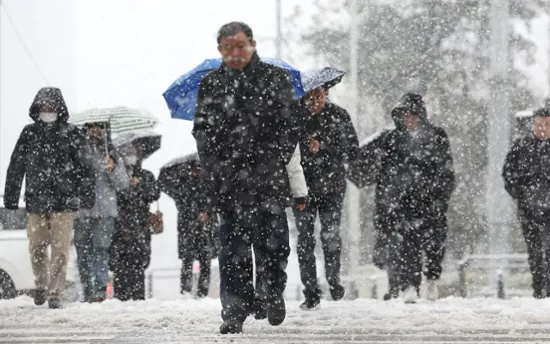
South Korea's Seoul Hit with Historic November Snowfall – Residents Brace for Impact!
2024-11-27
Author: Rajesh
Historic Snowfall in Seoul
In an unprecedented meteorological event, Seoul was blanketed by over 16 centimeters of snow this past Wednesday, marking the largest November snowfall since accurate records began in 1907. According to the Korea Meteorological Administration (KMA), the city recorded 16.5 cm of snow, surpassing the previous record of 12.4 cm set on November 28, 1972.
Weather Warnings Issued
This extraordinary snow event not only marks the debut of the season's snowfall but has also instigated a series of weather warnings. A heavy snow alert has been issued for northeastern districts in the capital, specifically Nowon, Seongbuk, and Dobong, with a cautionary notice when snowfall exceeds 20 cm within a 24-hour period.
Continued Snowfall Predicted
The snowfall isn't expected to slow down; many parts of the nation, including the greater Seoul area, North Chungcheong Province, and mountainous regions in North Gyeongsang Province, are predicted to receive 1 to 3 cm of snow each hour during the morning. The southern Gangwon Province will experience continued snow into the evening.
Impact on Transportation
One of the more disruptive effects of this record-setting weather has been felt at major travel hubs, with 12 flights canceled and 38 delayed as of 9 a.m. Moreover, commuters using Seoul's subway Line 9 faced delays of up to nine minutes during rush hour, leading to significant overcrowding on platforms.
Government Response
The interior ministry reacted swiftly by activating Level 1 operations of the Central Disaster and Safety Countermeasures Headquarters, heightening the heavy snow warning to a level of caution. Officials warned of potential traffic congestion during peak hours, icy roads leading to hazardous conditions, pile-up accidents, and increased safety risks for pedestrians.
Snow Removal Operations
As a measure to mitigate the effects of the heavy snowfall, snow removal operations commenced at 7 a.m. in collaboration with district governments and other relevant agencies. Key roads, particularly those leading to Mount Inwang and Mount Bugak, as well as areas near Gyeongbok Palace and Waryong Park, have been closed off to visitors to ensure safety.
Conclusion
This unusual weather episode serves as a stark reminder of the changing climates and its impact on urban landscapes, as officials urge residents to remain cautious while navigating their commutes. With winter barely beginning, all eyes will be on weather forecasts as South Korea braces for what could be an extraordinarily snowy season ahead. Stay tuned for live updates!



 Brasil (PT)
Brasil (PT)
 Canada (EN)
Canada (EN)
 Chile (ES)
Chile (ES)
 España (ES)
España (ES)
 France (FR)
France (FR)
 Hong Kong (EN)
Hong Kong (EN)
 Italia (IT)
Italia (IT)
 日本 (JA)
日本 (JA)
 Magyarország (HU)
Magyarország (HU)
 Norge (NO)
Norge (NO)
 Polska (PL)
Polska (PL)
 Schweiz (DE)
Schweiz (DE)
 Singapore (EN)
Singapore (EN)
 Sverige (SV)
Sverige (SV)
 Suomi (FI)
Suomi (FI)
 Türkiye (TR)
Türkiye (TR)